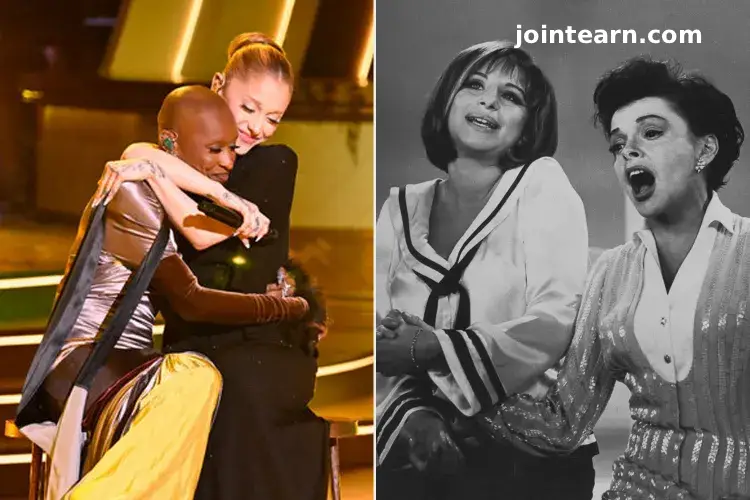
A Legendary Medley Returns to the Spotlight
Audiences watching NBC’s Wicked: One Wonderful Night on Thursday, November 6 were treated to a show-stopping surprise: a modern revival of one of the most iconic duets in music history.
Ariana Grande and Cynthia Erivo, who portray Glinda and Elphaba in Wicked: For Good, ended the two-hour musical special with a stunning rendition of “Get Happy/Happy Days Are Here Again.” The medley famously debuted in 1963 on The Judy Garland Show, where Judy Garland and a then up-and-coming Barbra Streisand performed it to unforgettable effect.
Grande and Erivo’s performance served as both a celebration of female artistry and a heartfelt bridge between musical eras — from Hollywood’s Golden Age to today’s most anticipated movie musical.
Recreating a Moment of Musical History
At the taping held at Hollywood’s Dolby Theatre, Grande and Erivo shared with the audience that they loved the medley so much, they decided to perform it twice. “Is that OK?” Grande joked to roaring applause before launching into an encore that brought the crowd to its feet.
Their arrangement stayed true to the Garland–Streisand original: Erivo began with Garland’s gospel-infused “Get Happy” while Grande followed with Streisand’s slow, emotional take on “Happy Days Are Here Again.” As the two melodies intertwined, the harmony built into a shimmering finale that evoked nostalgia, power, and sisterhood — themes deeply tied to Wicked’s story of friendship between two witches of Oz.
The Origins of “Get Happy” and “Happy Days Are Here Again”
Long before Garland and Streisand transformed the tunes into a cultural touchstone, both songs had deep roots in the Great American Songbook.
- “Get Happy” was written by Harold Arlen and Ted Koehler in 1930 and first performed by Ruth Etting. Judy Garland later immortalized it two decades later in her 1950 film Summer Stock, wearing her now-famous tuxedo jacket and fedora look — a performance that defined her cinematic legacy.
- “Happy Days Are Here Again” was composed in 1929 by Milton Ager and Jack Yellen, debuting in Chasing Rainbows. The song took on new meaning when Franklin D. Roosevelt adopted it for his 1932 presidential campaign as a symbol of hope during the Great Depression.
When Barbra Streisand reinterpreted “Happy Days Are Here Again” in 1962 as a slow, introspective ballad, she transformed it from a jubilant anthem into something soulful and complex — laying the groundwork for the legendary duet that would follow.
Garland Meets Streisand: A Historic 1963 Duet
On October 4, 1963, television history was made. The Judy Garland Show brought together Judy Garland, then 41 and already a Hollywood icon, with 21-year-old Barbra Streisand, who had just begun her meteoric rise after her Broadway debut in I Can Get It for You Wholesale.
Garland reportedly conceived the medley herself after hearing Streisand’s record. As recalled by Mel Tormé, Garland’s musical director, the star began singing “Get Happy” over Streisand’s slower arrangement of “Happy Days Are Here Again” — a spontaneous fusion that “jell[ed] into one extra-special opus.”
Their televised performance became one of the most cherished moments in entertainment history — Garland’s warmth and vocal power meeting Streisand’s youthful brilliance in a rare, transcendent harmony.
A Tribute Across Generations
By channeling Garland and Streisand’s chemistry, Ariana Grande and Cynthia Erivo brought a sense of reverence and renewal to their Wicked performance. The tribute wasn’t just a musical callback — it was a symbolic connection between eras of powerful women in music and film.
Grande, known for her crystalline soprano and pop precision, mirrored Streisand’s controlled, emotional phrasing. Erivo, whose Tony-winning voice carries raw theatricality, embodied Garland’s soul and spirit. Together, their duet captured the heart of Wicked: two strong, complex women finding harmony despite their differences.
A Duet That Stands the Test of Time
The “Get Happy/Happy Days Are Here Again” medley has continued to inspire performers for decades. It’s been reimagined by Liza Minnelli and Lorna Luft, Patti LuPone and Audra McDonald, and even revived on television in Glee (2010) by Lea Michele and Chris Colfer.
Barbra Streisand later reflected on the duet in her memoir My Name Is Barbra (2023), debunking rumors of rivalry between her and Garland. “She wasn’t just focused on herself,” Streisand wrote. “She watched me and responded to me. She would reach out and brush back a strand of my hair, like a mother.”
In a later interview with Howard Stern, Streisand added, “We became close friends because we could identify with one another. We felt each other’s pain somehow. We were made of the same ilk.”
Ariana Grande and Cynthia Erivo Carry the Torch
For fans of Wicked and musical theater, Grande and Erivo’s tribute represents more than nostalgia — it’s a reminder of how timeless songs and sisterhood can unite generations. Their duet closes Wicked: One Wonderful Night on a high note, perfectly setting the stage for Wicked: For Good, which opens in theaters November 21, 2025.
Their performance may be rooted in history, but its message — joy, resilience, and harmony through art — couldn’t be more relevant today.


Leave a Reply